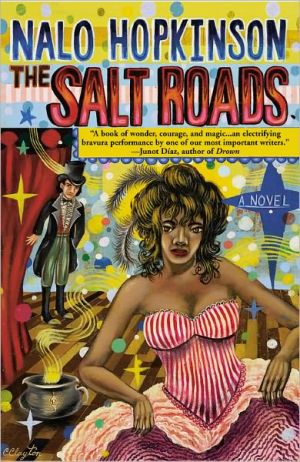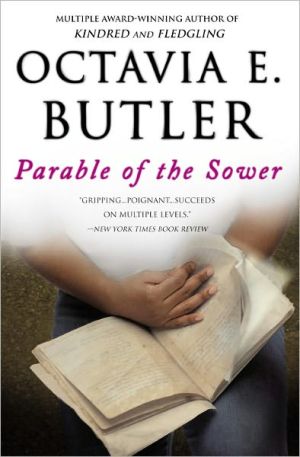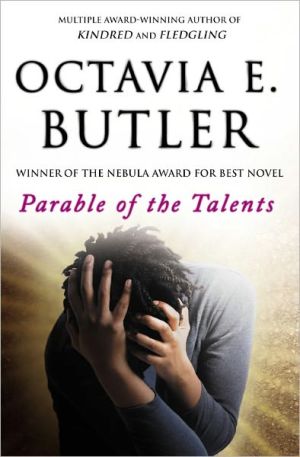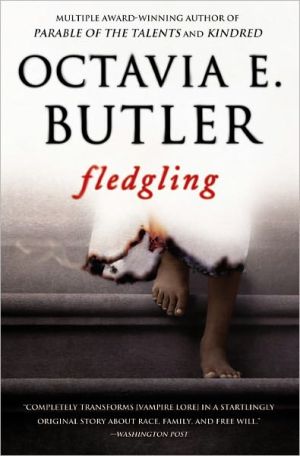The Salt Roads
- The Salt Roads was published in Warner hardcover (0-446-53302-5) in 11/03 and received rave reviews.\ - Nalo Hopkinson made her debut with Brown Girl in the Ring (1998), winning the Aspect First Novel Contest and the John W. Campbell Award for Best New Writer.\ - The author's previous book, Skin Folk (Aspect, 2001), won the World Fantasy Award for Best Collection, was named Recommended Fiction for 2002 by Black Issues Book Review, and was named a New York Times Best book of the Year....
Search in google:
- The Salt Roads was published in Warner hardcover (0-446-53302-5) in 11/03 and received rave reviews.- Nalo Hopkinson made her debut with Brown Girl in the Ring (1998), winning the Aspect First Novel Contest and the John W. Campbell Award for Best New Writer.- The author's previous book, Skin Folk (Aspect, 2001), won the World Fantasy Award for Best Collection, was named Recommended Fiction for 2002 by Black Issues Book Review, and was named a New York Times Best book of the Year. Hopkinson's Midnight Robber (Aspect, 2000), a New York Times Recommended Book of Summer 2000, received an Honorable Mention for the Casa de las Americas Prize. It was a finalist for the Nubula Award for Best Novel, the Hugo Award, and the Philip K. Dick Award.Publishers WeeklyWhirling with witchcraft and sensuality, this latest novel by Hopkinson (Skin Folk; Midnight Robber) is a globe-spanning, time-traveling spiritual odyssey. When three Caribbean slave women, led by dignified doctress Mer, assemble to bury a stillborn baby on the island of Saint Domingue (just before it is renamed Haiti in 1804), Ezili, the Afro-Caribbean goddess of love and sex, is called up by their prayers and lamentations. Drawing from the deceased infant's "unused vitality," Ezili inhabits the bodies of a number of women who, despite their remoteness from each other in time and space, are bound to each other by salt-be it the salt of tears or the salt that baptized slaves into an alien religion. The goddess's most frequent vehicle is Jeanne Duval, a 19th-century mulatto French entertainer who has a long-running affair with bohemian poet Charles Baudelaire. There is also fourth-century Nubian prostitute Meritet, who leaves a house of ill repute to follow a horde of sailors, but finds religion and a call to sainthood. Meanwhile, the seed of revolution is planted in Saint Domingue as the slaves hatch a plan to bring down their white masters. Ezili yearns to break free from Jeanne's body to act elsewhere, but can do so only when Jeanne, now infected with syphilis, is deep in dreams. Fearing that she will disappear when death finally calls Jeanne, Ezili is drawn into the body of Mer at a cataclysmic moment and is just as quickly tossed back into other narratives. Though occasionally overwrought, the novel has a genuine vitality and generosity. Epic and frenetic, it traces the physical and spiritual ties that bind its characters to each other and to the earth. (Nov. 12) Forecast: Hopkinson's sci-fi and fantasy following should give this novel crossover appeal, and African-American markets are a good bet, too. 10-city author tour. Copyright 2003 Reed Business Information.
\ \ THE SALT ROADS\ \ \ \ \ By Nalo Hopkinson\ \ \ Time Warner\ \ \ \ Copyright © 2003\ \ Nalo Hopkinson\ All right reserved.\ \ \ ISBN: 0-446-53302-5\ \ \ \ \ \ \ Chapter One\ \ \ BEAT ..., \ \ It went in white, but it will come out a mulatto in a few months' time, yes?"\ I was right; the oven of Georgine's belly was swelling up nice with the white\ man's loaf it was cooking to brown. I cackled at my own joke like the old woman\ I was becoming, stretched my neck a little to ease its soreness. A deep breath\ brought me salt-smelling air, blowing up from the cliffs at the foot of the\ plantation. Good to get away for a few minutes from stooping over sugar cane.\ Sixteen hours each day they had us working to bring the sugar in, and old Cuba\ the driveress would still push the first gang to pluck weeds sometimes into the\ deep of the night.\ Georgine just stared at me in fear, never mind it was she had brought herself to\ me by her own will. Then she whispered, "No, Auntie, not just mulatto. I'm\ griffonne, my mother was sacatra. The baby will be marabou."\ Eh. I ignored her, poked again at her belly, at her lolling on the flour bags\ that made my bed on the floor of my hut; she got to plant her behind in a softer\ bed nowadays-even had a mattress, I bet. I wondered if the ticks didn't bite her\ when she put her head on Mister Pierre's straw-stuffed pillows. I knew\ Georgine's type. Made her road by lying down. Lie down with dog, get up with\ fleas, they say. Silly wench, with her caramel skin. Acting the lady because she\ worked in the great house, washing white people's stained sheets till her\ fingers cracked and bled from the soap.\ Free-coloured Philomise had been making eyes at her; well-off brown man with his\ own coffee plantation and plenty slaves to work it, but no, our master didn't\ want a coloured to have her. Gave her instead to that yeasty-smelling carpenter\ imported to San Domingue-him from some backwards village in the ass end of\ France. And Georgine was puffing herself up now she had a white man, never mind\ he didn't have two coins to rub together. True, she had cause maybe to be happy.\ Pierre was looking after her well. She might get two-three free children out of\ it too, and if she gave him enough boys, her Pierre might release her from\ slavery finally. When she was old.\ But now she needed tending, and now that that flat-behind raw dough boy they\ called the plantation surgeon was too shy to even lay his hands on her belly to\ feel the baby, who did she come to? She didn't trust him. She wasn't an entire\ fool. Instead, she had found her high-coloured self to my hut.\ And her carpenter had come with her too. Got time off from mending the wain\ carts as they burst under the weight of the cane they were carrying to the\ factory. Waiting outside, he was; screwing his hat into shreds between his big\ paws. Frightened I would poison his Georgine, his goods. All the backra round\ these parts were frightened of poison nowadays. Black people's poison was\ showing up in the food and bad ouanga in their beds. But Mister Pierre was more\ frightened to see woman's business. So outside he stayed, saying it was more\ decent. Eh. What decent could mean to we with black blood? Who ever feared for\ my decency?\ Niger woman spoiled fine as any lady. She'd best watch herself. Slightest thing\ she did that mispleased that backra man, he'd pack her off, out of his little\ house. I went to turn up the hem of Georgine's dress. She gasped, flinched. I\ sighed. "Can't examine you with all this cloth in the way."\ She considered, set her mouth firmly. "Proceed, then." Proceed. Stupid wench.\ Pampered pet parrot, talking with backra's tongue.\ I touched her dress again. A soft cotton hand-me-down from some backra's wife,\ and dyed a yellow pale like ripe guavas. The fabric caught on the calluses of my\ hands. I ruched it up around her waist, exposed her smooth legs, her pouting\ belly, her bouboun lips covered in black crinkly hair. She was even paler where\ the sun didn't touch her. Bleached negress.\ Oh, but she was thin! Meager like the chickens scratching in the yard outside.\ "Eh," I muttered, on purpose as though my patient wasn't there, "would think the\ hair on the little bòbòt would be pale like the skin."\ Georgine gave a small sound, made to push the dress back down with her hands,\ stopped. Good.\ The clean salt scent of Georgine's body came up in my nose, mixed with sweet\ rosewater. Me, I smelled of sweat. Her thigh under my fingers was velvet smooth\ like my baby's, long lost. My body was dry wood after years of work; the brand\ that had got infected and nearly killed me tunnelled a ropy knot on my thigh.\ Her yellow dress reflected the sun back in its own eye. My one frock was a\ colourless calico cut from a flour sack, washed a thousand times, that Tipingee\ had darned for me over and over again, for my hands were impatient with needles,\ unless it was to sew up a wound. Georgine's skin was steamed milk with a splash\ of high mountain coffee. Me, the colour of dirt in the canefields.\ I poked and prodded at Georgine's belly while she tried not to squirm. I took my\ time, in no hurry to get back to the fields. My back was thanking me for having\ a rest. "When did you get pregnant?"\ "I don't know, Auntie," she said in a small voice. Know-nothing girl child.\ "When did your courses stop?" I asked, trying another way to get the answer from\ her.\ "Stop? They only started"-she was frowning, looking up into the ceiling while\ she did her figuring-"ten months ago. My first blood. Then I bled three times,\ three months, then pretty soon I started puking a lot, then I realised the\ bleeding had stopped. I thought it was going away and I was glad, for I didn't\ like the pain and the blood. I felt like the whole thing was only fatiguing me.\ When the bleeding came every month, I didn't have the strength to lift the\ washing down to the river. Marthe beat me one day, told me I was too lazy. So I\ was glad when the bleeding stopped, yes? It's Marie-Claire who told me I was\ pregnant." Her face got red and she smiled, glancing down. "For Pierre."\ Seven months, maybe more. But the child under my hands was too small for a\ seven-month baby. "How are you feeling?" "I'm tired all the time, matant. Even\ more than when I used to get my courses."\ I went and looked under her eyelids. Her colour was poor. Her blood was thin.\ "You and Pierre are eating good?" "Yes, matant! I'm keeping a nice garden\ Sundays when I have the day off. I'm growing cassava and pumpkin, plenty\ pumpkin. Pierre says I don't have to take none of it to market, for Master's\ paying him a wage we can both live on, if we're careful. Pierre says-"\ "Pierre says, Marie-Claire says. I'm asking about you, not about them."\ She looked chastened. "Yes, matant. What should I do, then?" Back in my home,\ back in the kingdom of Dahomey, every Allada girl child and woman would know\ what to do if a woman wasn't strong enough to carry her baby. Eat foods to\ strengthen the blood. "You have beets in your garden?"\ "No, matant. I should grow some?" "Yes. I wish if you could get liver too." "I\ get meat sometimes."\ Eh. Maybe she thought her Pierre was a fine hunter as well as all his other\ talents? "How do you mean, meat?" "Sometimes Pierre gets meat left over after\ the great house is finished eating dinner." "Don't eat that meat!"\ She jumped, startled to hear me speak so strong. "No, child," I said, "I don't\ mean nothing by it. Just that white people don't know about food. Plenty times\ their meat is spoiled and they're still eating it."\ "Oh. It tastes nice, though. Boeuf au jus with red wine sauce." Little bit of\ girl was making airs that she got to eat great house food. "You can't stay weak\ and tired like this and have a baby." "Oh," she said fearfully. "I'm going to\ die?"\ Pride made me speak to her as I did to other women. "You've ever seen an African\ live more than ten years once he set foot on this island?"\ Georgine shook her head no. Too right. Sickness and torture killed most of us on\ the journey across the bitter water, then the backra worked the rest of us to\ death when we got here. Plenty more were coming on the ships to replace us.\ "Well, I've been here twelve years. Was apprentice to my midwife mother before I\ came. That's why they made me doctress. Don't you worry. I've taken dozens of\ babies on this island live from their mothers' wombs and put them in their\ mothers' arms."\ She smiled. So I didn't tell her how many of those mothers had died of fever\ soon afterwards. Didn't tell how many of the babies had got the lockjaw, never\ breathed again. Didn't talk of my little dead one, so many years ago. Returned\ beneath the water to the spirits before his ninth night, so he had never really\ existed. No name for him. Except in my head. He was so beautiful, I called him\ Ehioze, "none can envy you." Should have been Amadi, "might die at birth."\ Back in my home, we cared for women when they were breeding, gave them the best\ foods. They rested for days afterwards with their babies, getting to know them.\ Here I must help starving women squatting in sugar cane whose children were\ fighting their way free of their wombs. Afterwards, I strapped their children to\ their backs and if they were lucky, they got a day's rest in the slave hospital\ before they had to get their black behinds back to work.\ A footfall came outside the window. A small face looked in on us, grinning. Then\ a shout came from outside: Georgine's owner man. Georgine screamed, "Who is it?"\ and shoved her clothing down over her thighs.\ "Just one of the little boys," I told her, loud so the carpenter would hear.\ "Get dressed." O Lasirèn, let him not beat the child. I stepped outside. It was\ Ti-Bois, all of his skinny six-year-old soul case quivering with excitement.\ "Sorry, Mister Pierre," I mumbled at the carpenter. He grunted, nodded, his eyes\ searching within my hut for Georgine. Ti-Bois had gotten off light this time.\ I hissed at Ti-Bois, "Why did you push your face in my window? Little door-peep.\ If you make the backra man vexed, you and me both could get whipped. Maybe we\ should call you Ti Malice, hein?"\ His face twitched a frightened, apologetic smile. "Sorry, matant, sorry Auntie\ Mer. It's the book-keeper who sent me. You must come quick; Hopping John stepped\ on a centipede in the sugar cane and it bit him. He's in the mill house, no time\ to take him to the slave hospital. Quick, Auntie; come!" He turned on his heel,\ running back for the canefields. I shouted for him to wait for me, then said to\ the carpenter: "Mister Pierre, Georgine's coming out now."\ He was frowning. He really looked fretful for his Georgine. "How is her health?"\ She was living; Hopping John might be dying. "She will be well, Mister Pierre. I\ already told her what she needs to do." His face cleared a little. "Good. You're\ to be with her when her time comes, at our house."\ "How ...?" "Your master gave permission." "Yes, Mister Pierre. I will send her\ out to you now." I dashed back into my room. "Someone's sick," I told Georgine.\ "I have to go and help." "But-"\ "You must grow beets and eat them, make yourself strong for the birth. And get\ ginger root and make a poultice, put it down there every night, on the opening\ to your bouboun." She got a scandalised look. I didn't have time for that. "Not\ strong enough to burn, mind. It will make the skin supple so the baby will pass\ through without tearing it. And tell your carpenter not to touch you until after\ you wean."\ She gasped. "So long?" "So long. Or your milk will be weak and your child won't\ thrive."\ Georgine looked down at her big belly like she was just now thinking of all that\ it signified.\ "Your baby is coming in two months, not more. When your birth time comes, I'm to\ be there with you, Master says. I have to go now." I ran through the door,\ leaving her questions on her lips. Maybe they would let Tipingee come with me to\ Georgine's birth.\ Lasirèn, pray you a quick death for Hopping John. Pray you no more of this life\ for him. Even though no gods answer black people's prayers here in this place.\ Halfway to the mill house, I had to pass under the big kenèp tree. I just had\ time to hear a rustling in the leaves, when a body jumped down out of it in\ front of me. It landed on its two feet, then overbalanced, but only had one hand\ to put to the ground to steady itself. Makandal. Come all the way from Limbé to\ make mischief.\ "Salaam ale ikum, matant," he greeted me. Peace be upon you. I didn't give him\ back his blessing. "Get out my way," I panted. "Someone's sick."\ He straightened, cradling the long-healed stump of his right arm in his left\ hand. After his accident, he wouldn't take food from the same pot with us any\ more. He was a Muslim, and they count the left hand unclean.\ Makandal stood tall. Grinned at me. "Tales flow from Hopping John mouth the way\ shit flows from a duck's behind," he said around a kenèp fruit in his mouth.\ "Always talking my business. Nayga-run-to-backra sometimes is in such a hurry to\ tell tales, he doesn't look where he's walking. Steps on something nasty. Gets\ piqué." He jabbed with a fingertip, a thorn biting into flesh. He put a fake\ sadness on his face. "It's a bad way to sicken, matant."\ "It's you made Hopping John ill!" Not a centipede, but a piquette in the fields;\ a piece of sharpened bamboo the brute had jammed into the ground, smeared with\ his poison on the tip. His smile brightened like the day. "I told the piquette\ to catch whoever was talking my business. Looks like I aimed it true." He spat\ out the pale ball of the kenèp seed. "Where's Marie-Claire?" he asked. "In the\ kitchen, you think? I have a new herb for her to flavour your master's food\ with."\ I skinned up my face to think of him sticking that left hand he used to wipe his\ ass with into the cook pot. All the Ginen thought Makandal was so powerful, that\ he was our saviour. Me, I didn't trust him. I made to shove past him. "Get out\ my way and go!" Runaway. Thief. Hiding in the bush and making off with the yams\ the Ginen must grow to feed themselves and their children. Calling himself\ "maroon."\ "I'm gone, matant Mer." And just like that, he disappeared. Turned to air? No.\ There he was, a manmzèl now, doing its dragonfly dance level with my nose. So\ like Makandal, playing games when I was about serious business. The manmzèl\ landed on my hand, its wings flicking like when you whip your back skirt hem to\ contempt somebody. It was missing half a front leg.\ "Get away, or I feed you salt!" I told him. Fleur had told me that Makandal's\ mother back in Africa had been djinn; a demon from the North, the desert lands.\ Me, I thought I knew how he strengthened the djinn half of him. Every man jack\ of us as we got off the slave ships, the white god's priests used sea water to\ make the magic cross on our foreheads and bind us with salt to this land. Maybe\ not Makandal.\ Continues...\ \ \ \ \ \ \ Excerpted from THE SALT ROADS\ by Nalo Hopkinson\ Copyright © 2003 by Nalo Hopkinson.\ Excerpted by permission.\ All rights reserved. No part of this excerpt may be reproduced or reprinted without permission in writing from the publisher.\ Excerpts are provided by Dial-A-Book Inc. solely for the personal use of visitors to this web site.\ \ \
\ Publishers WeeklyWhirling with witchcraft and sensuality, this latest novel by Hopkinson (Skin Folk; Midnight Robber) is a globe-spanning, time-traveling spiritual odyssey. When three Caribbean slave women, led by dignified doctress Mer, assemble to bury a stillborn baby on the island of Saint Domingue (just before it is renamed Haiti in 1804), Ezili, the Afro-Caribbean goddess of love and sex, is called up by their prayers and lamentations. Drawing from the deceased infant's "unused vitality," Ezili inhabits the bodies of a number of women who, despite their remoteness from each other in time and space, are bound to each other by salt-be it the salt of tears or the salt that baptized slaves into an alien religion. The goddess's most frequent vehicle is Jeanne Duval, a 19th-century mulatto French entertainer who has a long-running affair with bohemian poet Charles Baudelaire. There is also fourth-century Nubian prostitute Meritet, who leaves a house of ill repute to follow a horde of sailors, but finds religion and a call to sainthood. Meanwhile, the seed of revolution is planted in Saint Domingue as the slaves hatch a plan to bring down their white masters. Ezili yearns to break free from Jeanne's body to act elsewhere, but can do so only when Jeanne, now infected with syphilis, is deep in dreams. Fearing that she will disappear when death finally calls Jeanne, Ezili is drawn into the body of Mer at a cataclysmic moment and is just as quickly tossed back into other narratives. Though occasionally overwrought, the novel has a genuine vitality and generosity. Epic and frenetic, it traces the physical and spiritual ties that bind its characters to each other and to the earth. (Nov. 12) Forecast: Hopkinson's sci-fi and fantasy following should give this novel crossover appeal, and African-American markets are a good bet, too. 10-city author tour. Copyright 2003 Reed Business Information.\ \ \ \ \ Library JournalThis blend of historical fiction, fantasy, and folklore intertwines the lives of three women of African descent: Mer, a slave on a Caribbean sugar plantation; Jeanne Duval, mistress of poet Charles Baudelaire; and Meritet, a prostitute who becomes St. Mary of Egypt. These women share a connection to Ezili (the Afro-Caribbean goddess of love and sex), who inhabits their minds and, whenever possible, influences their decisions. None of the women has a simple life, but the share of violence, bitterness, and sadness in each is balanced by joyful sensuality. Nor are there any tidy endings to their stories; their lives, and deaths, are as rich and complicated as those of real people. The mortal women are compellingly portrayed with telling historical details and distinct voices. Ezili remains indistinct, as befits a goddess, and Hopkinson sometimes abandons straight narrative for poetry when Ezili speaks. Though the goddess connects the three women together, the women's tales themselves are much more interesting. Hopkinson has won several awards for her imaginative sf (Brown Girl in a Ring; Midnight Robber), which incorporates Afro-Caribbean mythology and folktales. Her latest book is a move out of that genre into magical realism. Recommended for most fiction collections. [Previewed in Prepub Alert, LJ 7/03; see "Must-Reads for Fall," p. 36.-Ed.]-Devon Thomas, Hass MS&L, Ann Arbor, MI Copyright 2003 Reed Business Information.\ \ \ Kirkus ReviewsHistorical fantasy with a strong erotic element from the Locus award-winning author. Hopkinson (Skin Folk, 2001, etc.) tells her story through the eyes of three women: Auntie Mer, a slave in French-colonial Haiti; Jeanne DuVal (LeMer), the black mistress of Charles Baudelaire; and Meritet, a Nubian prostitute in the Alexandria of a.d. 400. The three women are linked by Ezili, one of the love goddesses (or the lwa, to use the name their worshippers call them) of the voodoo pantheon, who travels across time to possess each of the three. The greatest tension exists in Auntie Mer's story, where the seeds are planted that will eventually result in the revolution freeing Haiti's slaves. The remnants of African religion-ruthlessly suppressed by the slave owners-are kept alive in secret midnight meetings, where the spirits of the lwa take human bodies to serve as their steeds. Jeanne DuVal preserves some of the memory of these deep African roots, which her French contemporaries consider as primitive, earthy, and exotic, an attitude underscored by quotations from Baudelaire's poems. Meanwhile, fifteen hundred years earlier, as the result of a comic series of misunderstandings, Meritet makes a journey from Alexandria to Jerusalem, ending up as an oddball saint of the new religion that will eventually become part of the mechanism of slavery in Haiti. Tied together somehow by Ezili, the three stories eventually coalesce into a centuries-spanning panorama of the cultural collision between Africa and Europe. Hopkinson renders the societies she portrays with careful attention to everyday details: the bustling brothel where Meritet works; the fearsome conditions of slavery on the sugar cane plantations;the decadent demimonde of Baudelaire's Paris. Sexy, disturbing, touching, wildly comic. A tour de force from one of our most striking new voices in fiction. Author tour\ \








